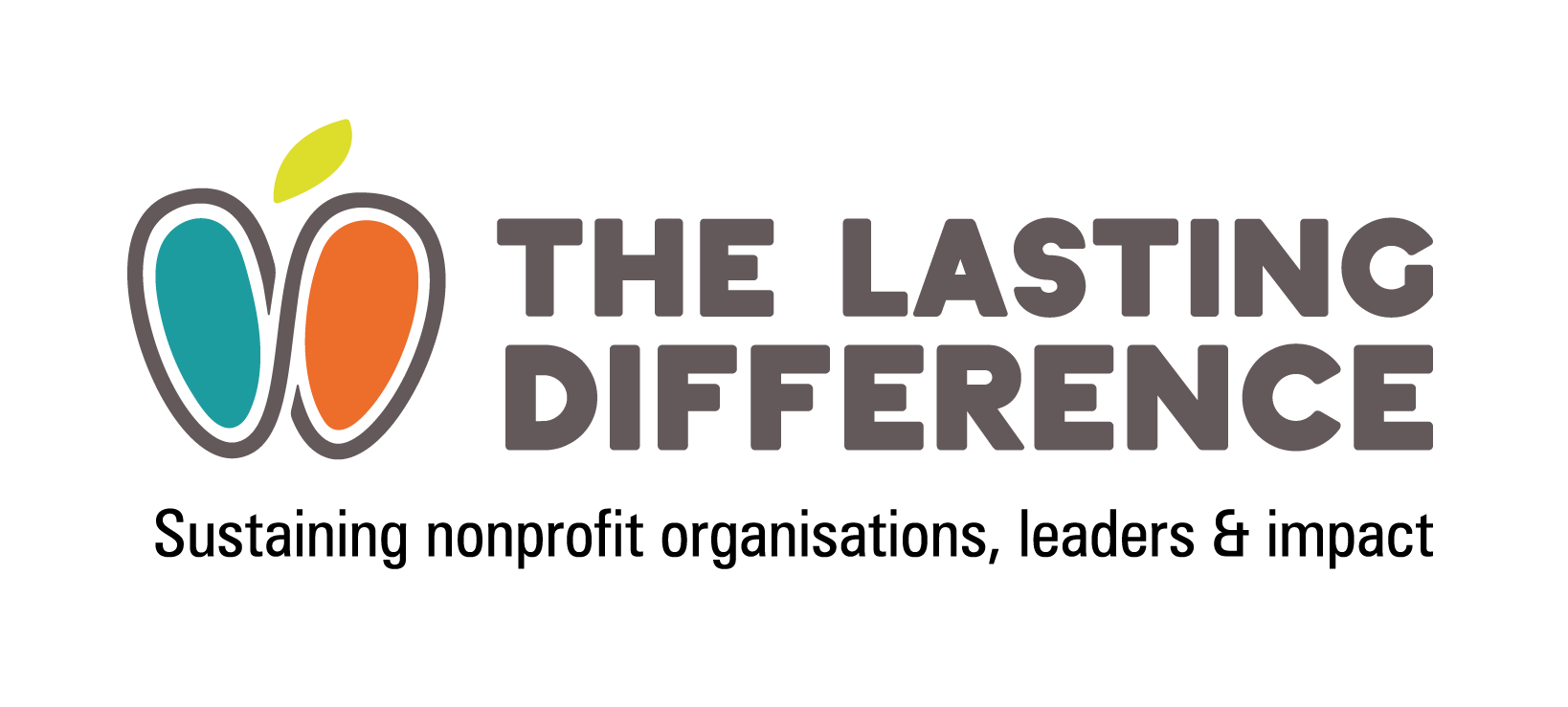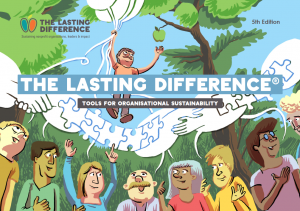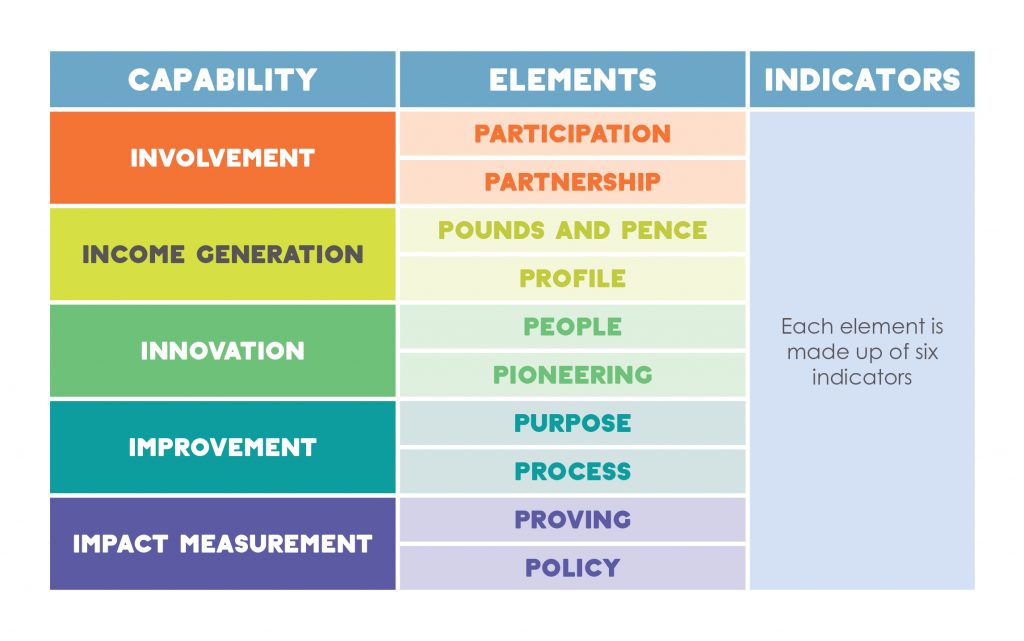
There are five capabilities that support organisational sustainability. These are introduced below along with some additional free resources.
For each capability, the Lasting Difference toolkit explores principles, practices, self-assessment activity and action planning templates.
Separate sections on implementation and leadership help you to take action on sustainability, regardless of your role. The toolkit starts by reframing the commonest sustainability challenges, and concludes with chapters on sustainable impact and exit strategies.
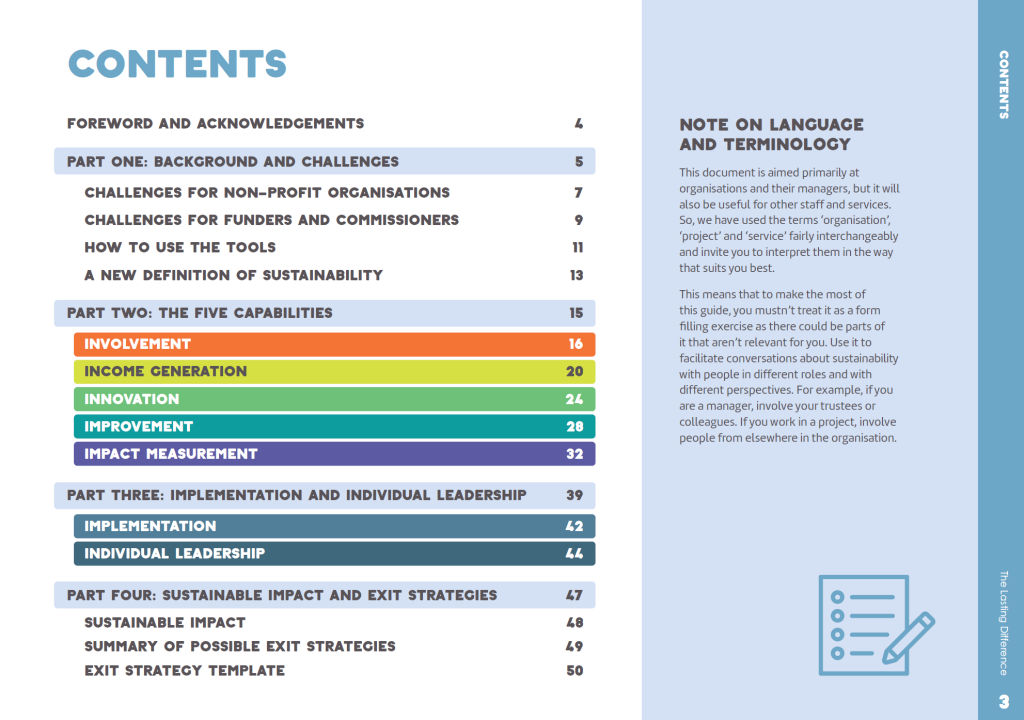
Download the toolkit as a PDF.
Involvement
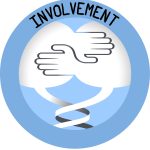 Who does your work belong to? Sustain your work by sharing it.
Who does your work belong to? Sustain your work by sharing it.
Involvement supports sustainability: sharing ownership and generating buy-in from people, communities, staff, board members and partners. Sustainable organisations are clear about why they should involve people and partners in their work. They might want to share power and control, generate new ideas, identify unmet need, or simply make sure they are still relevant.
The Lasting Difference helps you to make your involvement more rigorous, more representative and more engaging with these principles:
- Sustainability is a complex, adaptive challenge and there are no right or easy answers.
- Involving people in defining, exploring and solving challenges increases your chances of success.
- Solutions can and should come from the people who care most about an issue.
- Meaningful involvement requires time and resources. It’s an investment and doesn’t happen by magic.
- It is a privilege to be involved in people’s lives.
- Involvement is reciprocal. People are often willing to support you, but are you ready to enlist and accept their goodwill? Be clear on what people get from their involvement – and what you need from them.
Download the toolkit to explore how involvement can support sustainability whatever stage you are at in the your organisation’s or project’s development.
Income generation
Money follows good work, not the other way around.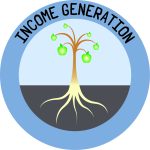
Most people think about sustainability in the context of money. Afterall, if organisations didn’t need money, sustainability wouldn’t be so much of an issue. But it’s not sustainable to carry on earning and spending, without taking time to think about where your money really comes from and what you’re trying to achieve with it.
The Lasting Difference helps you to take a fresh, analytical, holistic and strategic approach to Income Generation.
These are some of the other approaches and tools we find useful:
- Income Generation Strategy template – Use our free template to create well-structured strategies for income generation. It can also be used for marketing, business development and communication plans.
- Institute of Fundraising – Comprehensive coverage of fundraising policy, resources, events and networks.
- The Charity Social Media Toolkit – From the basics of starting out on social media to using it for effective fundraising.
- OSCR (the Scottish Charity Regulator) produce a helpful guide for charities who want to create or update their reserves policy.
- Funds Online is a database with over 8,000 funders with the potential to give away billions of pounds overall to organisations and individuals.
Innovation
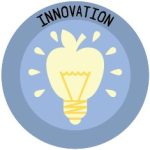 We are all creative. But we need time, trust and permission to play. And, at times, to fail!
We are all creative. But we need time, trust and permission to play. And, at times, to fail!
Innovation gets a bad name. It has become associated with the charade required by many funders, to repackage established initiatives as new or ‘innovative’. But innovation is vital for sustainability because it improves your ability to adapt and evolve. (Download the toolkit to discover how sustainability is all about change, not stasis!).
Radical new ideas and breakthroughs are rare. Most innovation is about incremental improvement in what is already there. As Carl Sagan said, ‘If you wish to make an apple pie from scratch, you must first invent the universe’.
People are motivated to make a positive difference and will do so given the resources and space. So, agree the outcomes and vision for innovation – and then get out of people’s way! Pilot ideas, do small tests of change and be prepared to fail fast and learn.
It is also improtant to manage capacity. Recognise if you or your team are overloaded and deal with this before generating more ideas. Give yourself and others the time and space to think, read, reflect, ponder and recharge. Finally, we suggest screening new ideas against your core purpose, aims, values and capacity.
This screening matrix contains helpful criteria for appraising new ideas against existing resources and priorities. It will help with strategic planning, funding applications and exploring the feasibility of development opportunities.
Improvement
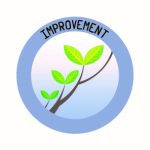 Sustainability ≠ sustained!
Sustainability ≠ sustained!
When we talk about sustaining something we’re not talking about keeping it going just as it is. Things change. Organisations and systems change as they evolve through different stages of their lifecycles. Sustainability requires us to evolve.
However, this also comes with risks. Because funding pays for activity and outcomes, non-profits that want to diversify income (that’ll be everyone then!) have to diversify their activities or outcomes. This can lead to them becoming pulled out of shape – or losing their way altogether. Sustainable organisations develop criteria for assessing new opportunities, helping them to be clear on what to say yes – and no – to. The idea screening approach mentioned under ‘Innovation’ above can help.
Download the Lasting Difference to find out more about what we call the Octopus Paradox and how to manage it. Or buy the book to find out how funders, boards, managers, operational teams and policy makers can all tame the octopus.
Impact measurement
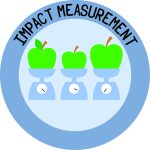 What’s your story? What messages are you sending?
What’s your story? What messages are you sending?
To be sustainable, organisations need convincing evidence of need and compelling stories of impact. Being able to evidence the need for your work, and the difference it makes, are fundamental. Sustainability requires constant learning about what works – and what doesn’t.
Focusing on making a lasting difference right from the start improves sustainability in lots of ways.
- Once the need for a piece of work is clearly understood, activities and resources are focused on where they can be most effective. There are baselines to measure progress against.
- Evaluation isn’t left until the end, it’s built into everyday practice – projects have clear outcomes to work towards, and systems are in place to measure them.
- Evidencing your impact shares learning and builds trust with the people you serve, your colleagues, managers and boards, and your funders, donors and commissioners.
- Having credible evidence can also help to influence organisational, local or national policy.
The problem with measuring impact therefore isn’t about why it matters. It isn’t even about how to do it: there are lots of tools and frameworks available. It just takes time to think about how to make them work for you. Download the free toolkit for practical suggestions about why, when and how to do this.
Sustainable Impact and Capacity Guide: The Lasting Difference toolkit gives an overview of sustainable impact, but this free resource is the comprehensive guide. Containing practical ideas and straightforward suggestions, the guide identifies seven main ways (‘domains’) you can make a lasting difference with your work.
Making a Lasting Difference: Buy the full-length book to find out more about using evidence to inform policy and help sustain organisations and impact.
FIND OUT MORE
CONTACT US
Contact: info@thelastingdifference.com
